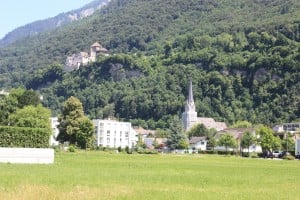I spent the Fourth of July holiday in the Fürstentum Liechtenstein, a very beautiful and surprisingly inaccessible part of Europe. Its capital city has no airport. The country is also largely vertical, as it is sandwiched in the Alps between Austria and Switzerland. While enjoying a cappuccino in an outdoor cafe in Vaduz, the principality's capital, on a warm afternoon, the sight of the prince's palace looming directly above me brought to mind the "natural born citizen" qualification for the U.S. Presidency. Article II, Section 1 of the U.S. Constitution provides:
No Person except a natural born Citizen, or a Citizen of the United States, at the time of the Adoption of this Constitution, shall be eligible to the Office of President; neither shall any Person be eligible to that Office who shall not have attained to the Age of thirty five Years, and been fourteen Years a Resident within the United States.
I won't wade into the meaning of the term "natural born", but the prince's castle reminded me that in Europe it was common for countries to be ruled by foreign born and even absent princes. The modern principality of Liechtenstein came about in 1699 when Prince Johann Adam purchased the land (he made and additional purchase in 1712). In 1719, the Emperor Karl VI granted principality status to the purchased land. The princely house, however, owned property elsewhere and did not move to Liechtenstien until 1938.
Liechtenstein is hardly unusual in having a foreign born monarch. In 1714, for example, England turned to the Elector of Hanover when Queen Anne died without issue. Ruling as George I, the elector proved to be unpopular in his kingdom. No doubt, his subjects had difficulty relating to a sovereign who spoke German, but not English. His grandson, George III, proved to be even more unpopular in his American colonies (and so, I come back to where I began this post - the Fourth of July).
The California Constitution does not require that a governor be a "natural born citizen", but it does require that he or she at least have spent some time in the state:
The Governor shall be an elector who has been a citizen of the United States and a resident of this State for 5 years immediately preceding the Governor’s election.
Cal. Const. Art. V, § 2.
The Palace sits above Vaduz, the principality's capital



.png?width=100&height=100&name=corporate_law_blogs%20(1).png)